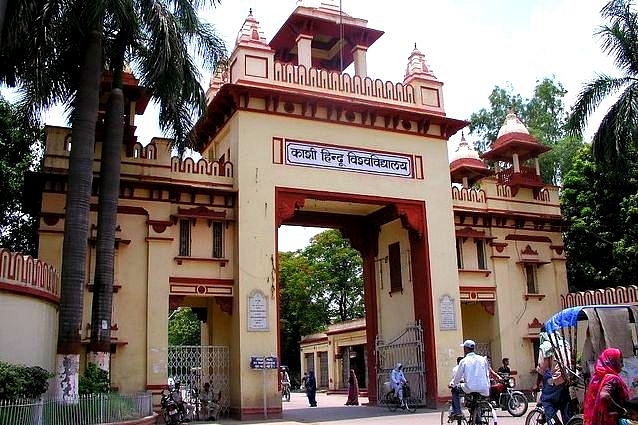
The Real Pros And Cons Of BHU’s Sanskrit Department Recruiting A Muslim
The real challenge is to produce more and more scholars steeped in Indic traditions.
If there are enough scholars with the right dharmic input in them, the entry of the odd Muslim scholar will not worry anybody.
The Banaras Hindu University’s decision to appoint a Muslim, Firoz Khan, as an assistant professor to teach Sanskrit, has – inevitably – raised a storm of protest from a section of its students.
Among the candidates available, Khan was apparently the most qualified, and ordinarily there should be nothing wrong in appointing him. But many students are outraged that a Muslim should be teaching them their sacred language and scriptures.
A Swarajya colleague, Arihant Pawariya, has argued strongly against letting bigotry get in the way. He has debunked arguments against appointing a Muslim to teach Sanskrit literature in a department titled Sanskrit Vidya Dharm Vigyan. He said: “It is ridiculous to suggest that (even) theology can’t be taught by non-believers, be it Hindu, Islamic or Christian. Scholars across the world have been doing so for many centuries and will continue to uphold that tradition. Was Dr Bhimrao Ambedkar a scholar on Islamic theology? Was Dayanand Saraswati? Would we better off if those two had not written on Islam?”
K Bhattacharjee, writing in Opindia.com, has argued equally passionately against letting Khan join the department, holding that the demand to not let a Muslim teach Hindu Dharm Vigyan is not bigotry. His argument is summed up in these sentences: “Someone who doesn’t have faith in the sacred texts of the Hindu faith doesn’t have the necessary skill-set to teach Hindu theology to students. This is not communal bigotry…Throughout the entire controversy, we witness again the utter lack of respect for sacred spaces. Under the universalist march of secularism, Hindus are expected to even surrender the teaching of their theology to non-Hindus. This desire to trample upon the sentiments of the Hindu community, regardless of consequences, is precisely what leads to unfortunate circumstances such as the one at BHU.”
The truth, as usual, lies somewhere in-between. Yes, it is bigoted to keep someone out of a professorship just because of his faith, when his qualifications do not warrant such discrimination. On the other hand, it is not unreasonable to suggest that one should be cautious when one does not know the motivations that bring a Muslim into teaching Sanskrit, a language that holds the key to dharmic thought.
Scholars and academics cannot be separated from the motivations that drive their scholarship. But, equally, one cannot ask them to lay off just because their motivations are less than bona fide.
For every David Frawley or a Koenraad Elst who has dived deep into Hindu tradition and vedic knowledge with the best of intentions, there are the Sheldon Pollocks, Wendy Donigers and a whole busload of Western Indologists in US academe who seek to undermine Hinduism from within through a control of scriptural interpretations and narrative. Even evangelical Christians, from Roberto de Nobili to present day conversion mafias, seek to learn Indic traditions – a strategy called inculturation – in order to make it easy from Hindus to convert to Christianity.
Thus, Hindu cultural properties, from the dhwaja sthambams to saffron robes, mangalsutras and yoga, have been misappropriated by evangelists to further their own conversion agendas. Even rogue Muslim preachers like Zakir Naik have delved deep into Hindu mythology in order to use this knowledge to ridicule Hinduism and gain converts.
But, the other side of the coin is this: you cannot protect your property if you do not seek to own it and zealously protect its intellectual property rights (IPR). A yogic property unprotected by widespread practice and certification controls on who is authorised to teach it will essentially be stolen. Ditto for Sanskrit scholarship. If enough people schooled in the Indian tradition do not learn Sanskrit, the language will be appropriated by outsiders to these traditions, often for their own narrow purposes.
No one can stop anyone from embracing knowledge and traditions other than his own, even given a mala fide intention to eviscerate or “digest” them. This cultural misappropriation can only be fought by a larger investment in people who are schooled in your own tradition, and not by arbitrarily erecting barriers to their entry in BHU. If there are not enough good quality Indic scholars who can publish English translations of Indic literature, a Rohan Murty will seek out a Sheldon Pollock to do the job.
Then there is also the other truth: you can’t defend something if you do not also have offensive capability. What a Pollock can do to Sanskrit studies or a Wendy Doniger to the interpretation of Hinduism, an Indian should be able to do to Christian and Islamic studies, provided she has devoted decades of effort to doing a purva paksha on these Abrahamic tradition and civilisations.
The argument between Pawariya and Bhattacharjee is akin to the one between free trade advocates and protectionists. You can’t embrace free trade unless you are competitive, and that may need some protection. But protection can’t be an end in itself, for then you will never be competitive.
You can protect a BHU from hiring its next Muslim Sanskrit professor, but ultimately the only answer is to develop enough high-quality Sanskrit scholars schooled in the dharmic tradition so that they top the qualifications chart. If there are enough scholars with the right dharmic input in them, the entry of the odd Muslim scholar will not worry anybody.
The challenge is to produce more and more scholars steeped in Indic traditions, and also scholars who become experts in Abrahamic theology and civilisational knowledge, so that the playing field is level over the next generation. Or we will continue to remain mentally colonised, afraid of taking on the world confidently.